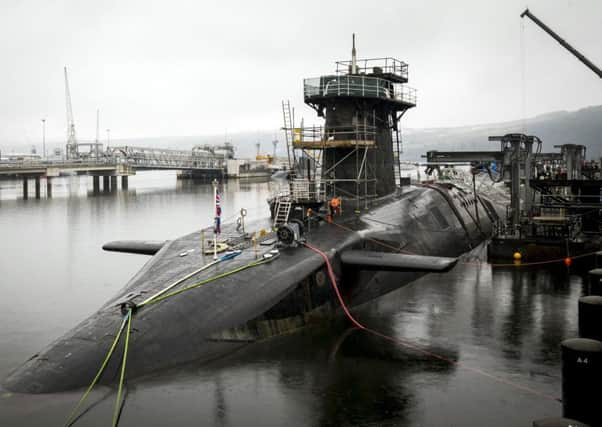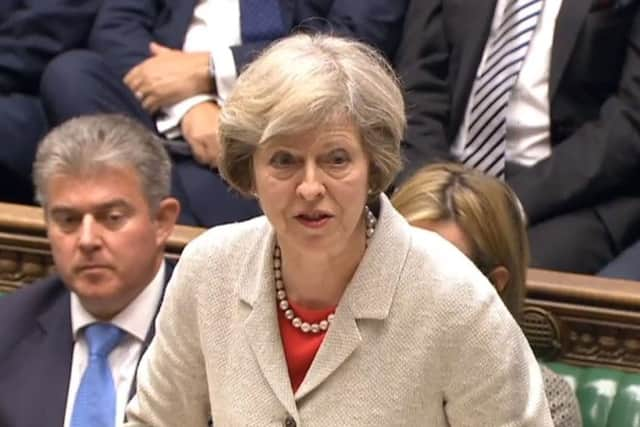Holyrood urged to remove Trident despite MPs backing renewal


The Prime Minister said the Trident weapons system was an “essential part of our national security” and did not hesitate when asked if she would use it in a nuclear conflict.
MPs voted by 472 to 117 in favour of a motion supporting replacement of the four Vanguard-class missile submarines that carry the UK’s nuclear arsenal.
Advertisement
Hide AdAdvertisement
Hide AdThe vote followed a six-hour debate on Monday that confirmed the depth of the rifts in Labour, with several of the party’s MPs lining up to condemn Jeremy Corbyn. Mr Corbyn, who faces a leadership challenge and open revolt among his MPs, was one of 48 Labour members who broke with official party policy to vote against renewing Trident.


All but one of Scotland’s 59 MPs opposed renewal, the exception being Tory David Mundell. Following the vote, SNP Westminster leader Angus Robertson called on the Scottish Government to “respect Scotland’s clear decision” and remove Trident nuclear weapons from their base on the Clyde.
“It would be democratically unacceptable if in the face of this clear opposition the UK government were to impose Trident nuclear weapons on the Clyde against Scotland’s wishes,” Mr Robertson said.
Opening the debate, Ms May accused opponents of Trident renewal of being “the first to defend the country’s enemies”, drawing an angry response from Green Party MP Caroline Lucas, who mouthed the words: “How dare you.”
“Some people suggest that we should actually be removing our nuclear deterrent,” Ms May said. “This has been an essential part of our national security and defence for nearly half a century now, and it would quite wrong for us to go down that particular path.”


Ms May was asked by SNP MP George Kerevan whether she was “personally prepared to authorise a nuclear strike that can kill a hundred thousand innocent men, women and children”.
The Prime Minister replied: “Yes.” Referring to Mr Corbyn’s comments last year that he would order the UK’s nuclear weapons never to be used if was elected prime minister, she added: “I have to say to the honourable gentleman the whole point of a deterrent is that our enemies need to know that we would be prepared to use it, unlike some suggestions that we could have a deterrent but not actually be willing to use it, which seem to come from the Labour party frontbench.”
Ms May warned that Russia was upgrading its nuclear arsenal and conducting more missile exercises, while North Korea has enough fissile material to build more than a dozen nuclear warheads and the technology. “The nuclear threat has not gone away. If anything, it has increased,” the Prime Minister said.
Advertisement
Hide AdAdvertisement
Hide AdReplacing the four Vanguard-class submarines based at HM Naval Base Clyde at Faslane will cost at least £31 billion over 20 years, with another £10bn being put into a contingency fund.
However, the majority of the cost over the 30-year lifetime of the new submarines will be spent on maintenance and upkeep, estimated at roughly 6 per cent of annual UK defence budget.
The Prime Minister was repeatedly challenged by Mr Robertson to provide a figure for the total cost of Trident replacement, which critics have claimed could reach £205bn.
During the debate Mr Robertson also warned that a vote for Trident would bolster the case for a second independence referendum, saying it was “not a normal situation for the state to totally disregard the wishes of the people”.
He said: “It will be for the Scottish people to determine whether we are properly protected in Europe and better represented by a government that we actually elect – at this rate, that day is fast approaching.”
Ms May told the SNP benches they were “voting against jobs in Scotland”, and said Trident was an “insurance premium of 0.2 per cent of government spending” that was “worth every penny”.
One of the few Conservative MPs to oppose Trident, the Commons foreign affairs select committee chairman Crispin Blunt, said the cost of replacement was “the most egregious act of self-harm to our conventional defence”.
Mr Corbyn gave a free vote to Labour MPs, despite the party launching the Trident renewal programme while in government and supporting it in their 2015 election manifesto.
Advertisement
Hide AdAdvertisement
Hide Ad“I make it clear today I would not take a decision that kills millions of innocent people,” the Labour leader said. “I do not believe the threat of mass murder is a legitimate way to deal with international relations.”
Labour MPs, some of whom were among those who resigned from the shadow cabinet in protest at Mr Corbyn’s leadership, repeatedly intervened to admonish him over failing to respect party policy.
John Woodcock, the Labour MP for Barrow and Furness where BAE Systems has its submarine shipyard, told the PM that support for Trident renewal remained “steadfastly Labour Party policy” despite opposition from the frontbench.
He was swiftly condemned on Twitter by Diane Abbott, the shadow secretary of state for health sitting two rows in front of him, who said Mr Woodcock had been “cheered to the echo by Tory MPs”.
Trade unions representing workers in the shipbuilding and defence industries voiced anger the departure from Labour Party policy.
Tim Roache, the head of the GMB union, said he would ballot the 640,000 members of the union on whether to withdraw its support of Mr Corbyn’s leadership.